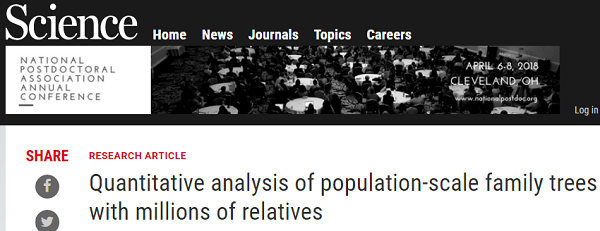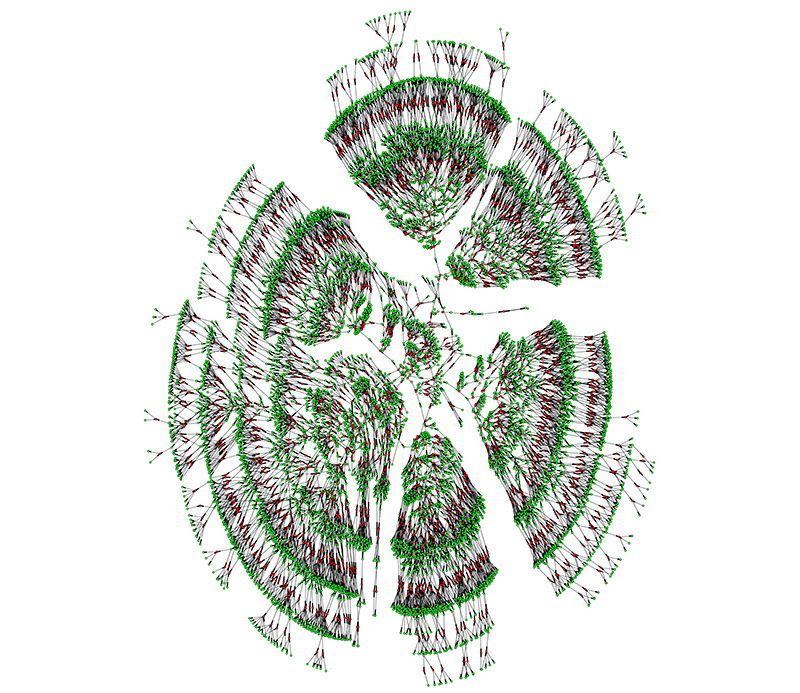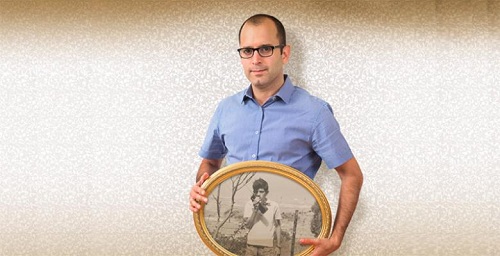Release date: 2018-03-15

Image source: Science (DOI: 10.1126/science.aam9309)
A recent study published in Science published the largest family tree ever: this milestone dataset associated 13 million people with blood or marital relationships, spanning an average of 11 generations. It is based on this huge family tree that scientists have reached the above conclusions.
In this paper entitled "Quantitative analysis of population-scale family trees with millions of relatives," computational biologist Yaniv Erlich of Columbia University and colleagues analyzed the birth and death dates of the family. It is assessed if they are more likely to die at a similar age if they are close relatives.
The results show that inheritance only accounts for less than one-fifth of the difference in life span of these people. Most of the differences are due to other factors, such as people's place of residence and lifestyle. At the same time, studies have shown that genes that affect longevity work independently, not interactions.
Erlich said: "The 'good' gene may extend a person's lifespan by an average of five years, but some environmental factors have a greater impact on longevity. For example, smoking can be reduced by 10 years."
Although scientists have previously suspected that the environment has a greater impact on human life than genes (a study in 2001 estimated that genes determine about a quarter of human life changes), this new achievement suggests that the role of genes It may be less than the researchers think. For scientists who are looking for longevity genes, this means that achieving their goals may be difficult.

This 6,000-person family tree was cleaned and organized using graph theory. Individuals are shown in green, spanning seven generations; marriages are depicited in red.Credit: Columbia University
Huge data
In fact, geneticists have used genealogy to study how genetic traits affect traits (eg, disease risk) for a long time. However, the formation of a family record data set containing a large population is costly and difficult. At present, a number of scientists are conducting research, some of which have identified genes associated with diseases such as cancer and Alzheimer's disease.
Erlich's research uses data from the online genealogy tool Geni.com, one of the world's largest collaborative genealogy websites, where users share their genealogy on Geni. He is currently the Chief Scientific Officer of MyHeritage, the parent company of Geni.
Erlich's original idea about this research dates back seven years. At the time, he received an email from a distant relative through Geni.com, then contacted the company's chief technology officer and obtained the right to download tens of millions of publicly available materials on the site. This information includes the user's name, gender, date and place of birth, date of death, and immediate family members, but no DNA information. In the end, they analyzed data from about 86 million people.
Atul Butte, a computational genomics expert at the University of California, San Francisco, said: "The number of participants at this level is crazy. Scientists can only get such data sets through crowdsourcing. This is really impressive. ."
Other findings
In addition to investigating the impact of genes and the environment on life, the Erlich team used the data to analyze patterns of immigration and marriage. It was found that before 1750, most Americans and Europeans in the dataset married "people who lived up to 10 kilometers from their birthplace." By 1950, most Americans and Europeans had to go to at least 100 kilometers from home to find a spouse.
Erlich said: "All of this helps us understand how genes are transmitted in a geographical area." He also said that the current findings only touched the surface of the potential use of this huge family tree. Now his team has begun to use a website called DNA.Land to further study this spectrum. On DNA.Land, users share their DNA genotyping data (from data from some companies' consumer DNA testing services such as 23andMe, MyHeritage) and fill out a health survey.

Yaniv Erlich. (MyHeritage)
Significant
Peter Visscher, a geneticist at the University of Queensland who was not involved in the study, said: "This research is very clever use of crowdsourced data to solve many interesting scientific problems. If it can be linked to health information, explore the role of genes in disease. , then it will bring more meaning."
Lisa Cannon-Albright, a geneticist at the University of Utah, said: "The findings of Erlich et al. demonstrate the power of genealogy. Such resources will be a powerful part of future genetic research."
In addition, Melinda Mills, a demographician at Oxford University, believes that this is an exciting time for citizen science. The study is a good example of how millions of ordinary people have an impact on science.
Reference material
World's largest family tree reveals environment's influence on lifespan
Thirteen million degrees of Kevin Bacon: World's largest family tree shines light on life span, who marries
Crowdsourced family tree yields new insights about humanity
Source: Bio-Exploration
Canned Green Beans Cut,Green Beans Cut Canned,Mung Bean Canned,Green Beans Cut Tin
ZHANGZHOU TAN CO. LTD. , https://www.zztancan.com